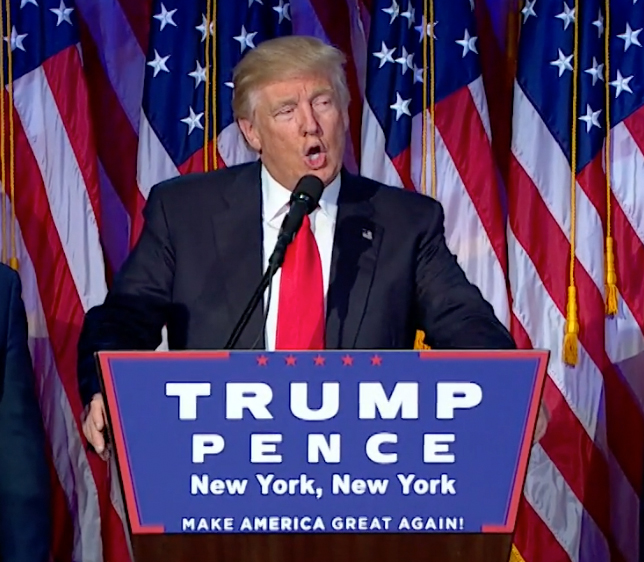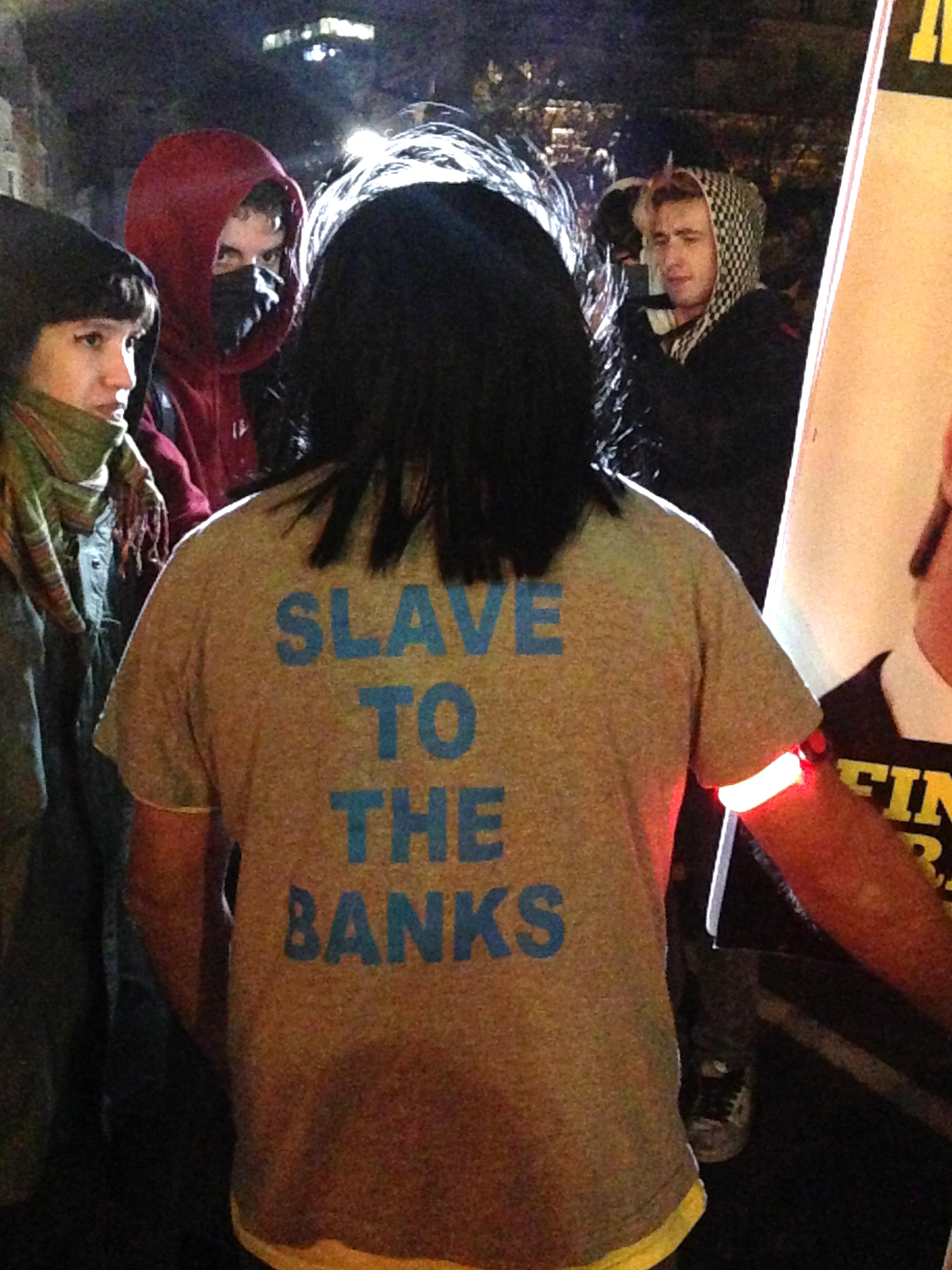
Humans are emotional first and rational second. I’ve long believed this and the events of the last 12 months have merely confirmed this in my mind.
This is not to say we are incapable of acting rationally in our own self-interest, either individually or collectively. But what it does mean is that our decisions are framed not only by the choices we’re confronted with, but by the emotional power of the symbols and narratives that make up our belief systems.
What the last year has also confirmed to me is how ill-equipped the political Left is in trying to influence the qualitative, emotionally-charged challenge of meaning and belief. This is not to say that if it played its hand to its fullest advantage, it would sweep to power. But it seems to me that it’s barely at the races, let alone in the race.
Much of the political Left is reacting with startled disbelief at Donald Trump’s rise to become US President-elect. It’s almost exactly the same startled disbelief that disabled much of the British Left as an effective political force in the wake of June’s Brexit vote.
There is no doubt that the challenges are enormous, but the Left has in many cases retreated into the comfortable traditions borne of distant victories and today’s struggle of futile resistance. The Left is still reading from a narrative about collectivised labour, of some generalised socialist fraternity, of statist protections; of a defensive position that has been comprehensively eroded and discredited since the Thatcher-Reagan years.
Today, these ‘workers’ prefer to see themselves as self-realising consumers whose consciousness is divided into market niches of segmented identities and needs. They might increasingly see their employment as meaningless, debased and precarious. But, in the absence of a believable alternative dream, their fight is more about clinging onto what they’ve got than jumping ship from the endless, deadening treadmill of economic growth.
The fact that there is a widespread feeling of rage against the machine is undeniable. It’s not confined to Britain, the US or Europe. It’s a global phenomena, though one without a political focus.
Unfortunately, the Left’s lack of traction in this process clearly shows three things. Firstly, it does not have the conceptual tools to reliably stir its natural power base, let alone park its intellectual tanks on opposition territory. The emotional connection between the political narrative and the experience of ordinary people has turned to dust, thanks to a seemingly-terminal lack of imagination, ambition and courage.
Secondly, even if the Left did have the conceptual tools, it has not found a way to use mass media to effectively communicate its message beyond its core support. This goes to the heart of the very notion of democracy, which is dominated by psychopathic political and economic elites which shape policy formulation and the news agenda. The Left’s failure to openly accept and articulate the problem betrays a touching, and hopelessly misplaced, faith in a profoundly hostile system.
Thirdly, the Left has not accepted, even less articulated, the moral case for challenging power – and especially corporate and economic power – and thus has not come close to developing a strategy around applying any political and economic leverage for change. This lack of imagination and ambition is in evidence even when one observes those outside the established political system. Pounding the streets of central London during last Saturday’s Million Mask March, organised by the ‘hacktivist’ ‘organisation’ Anonymous, it struck me how futile and eminently containable such otherwise laudable efforts are. In its current form, protest is toothless.

In the UK and US, the traditional Left has almost wilfully made itself into a self-indulgent, irrelevant force that even despised by the very people who should appreciate its support. The UK’s Labour Party has so lost its connection with ‘ordinary working-class people’ that even the hideous Theresa May can court their support without being mercilessly ridiculed. Over in the US, the way the Democratic Party establishment unfairly weighted the presidential campaign against Bernie Sanders is another prime example. Though hardly a socialist firebrand, Sanders tapped into a rich vein of working- and middle-class fury. But his agenda was dismissed by the Democratic elite as dangerous and counter-productive, and he meekly bowed out of the political battle.
This was despite the fact that opinion polling research clearly suggested he was not only more popular than Hillary Clinton among likely Democratic voters, many of whom disliked her history of dishonesty and corporate cronyism, but he was much better equipped to fight Donald Trump. He articulated real concerns, yet the political establishment smothered him and he was ultimately happy to defer to its sense of entitlement.
In other words, the Left has barely spoken to today’s politics of rage. And the fact this rage exists is surely now blindingly clear. Brexit was not the only precursor to Trump; remember the now-stalled anti-austerity movements in Greece and Spain (though Portugal’s still lives on), along with the decline of the established political Left in countries such as France and across much of Europe. Happily, though it has failed to grapple with the politics of rage and is in some disarray, economic instability is likely to provide opportunities to fight back – among them the fallout from Italy’s forthcoming constitutional referendum and the persistent weakness of its financial system.
The Left has the tendency to romanticise far-distant battles in a bid to rekindle a golden post-war consensus that actually preceded today’s unremitting industrial decline. While the successful battles for worker rights, for instance, are worth celebrating, they do nothing to disguise 30 years of industrial and political retreat.
Quite the opposite, in fact, because such lapses effectively cede the initiative to a neoliberal elite that never tires of using a technocratic agenda of economic growth to increase its share of wealth and power.
So, the Left should dispense with triangulation, and not only because the problems we face require fresh, radical ideas. The centre ground is not a place where you’ll find vision and courage because it’s too rooted in compromise and the denial of truth. What’s more, the ‘centre ground’ almost certainly no longer exists, if indeed it ever really did. The idea that a progressive managerial class can reclaim the centre ground for the Left is a sad delusion that will take us nowhere.
Instead, if the Left is ever to regain the initiative, it must expose the mundanities of economic power. For instance, a monetary system that relies on fractional-reserve banking is one that gives a parasitic, rent-seeking financial elite the invisible power to fleece the population of its wealth and freedom through debt-dependancy and the inflation of unsustainable asset bubbles. The banking sector’s role in the cycle of boom and bust and promotion of overconsumption and climate change has never been properly aired politically. The Left could usefully popularise public understanding of the Minsky moment.
Any Left agenda that does not seek to regain control of the money supply from the banks and replace their debt-money with some form of sovereign money will never address the core driver of inequality and is doomed to fail.
As part of this, the Left must explicitly start talking about neoliberalism in terms that ordinary people can understand and relate to. Neoliberalism is dangerous precisely because it’s a love that dares not speak its name. None of its supporters identify themselves as neoliberals, while the whole neoliberal enterprise is anti-democratic because it seeks to move the servicing of all need into private hands. If EU membership can be portrayed as a theft of sovereignty while the extension of corporate power is allowed to remain faceless and invisible, then the custodians of the Left have abandoned their heritage and the people they claim to represent.
Moving forward will also involve the Left accepting uncomfortable facts about capitalism. For instance, without accepting that ‘the market’ has been the greatest dynamo of wealth creation known to man, the Left cannot talk honestly about its flaws. The Left needs to start addressing the issue of market failure, an easy-to-understand economic concept with a rich history and a wealth of political applications. Indeed, it can easily be argued that the state grew during the first half of the last century precisely because of market failure. But it can equally be argued that the state grew well beyond the consequences of market failure to become a burden on its own citizens. The Left’s abject refusal to ever mention market failure or put forward any equitable notion of state power is an abdication of responsibility and a retreat from the truth.
The Left must also develop and project a greater understanding of and empathy with the desire of ordinary people to improve their own lives. Human beings are much more than simple units of consumption as defined by today’s pseudo-classical economists; we are social and emotional beings connected by much more than economics. We are co-dependant, which means that without specific counteracting measures, such as the implementation of progressive taxes, some of us become richer precisely because those who only have their labour to sell are poorer and more numerous – a mechanism described by Thomas Piketty in Capital in the Twenty-First Century. This is one of the consequences of how markets work that is obscured by our emotional sense of entitlement.
Is the market there to serve us or to rule us? I would suggest that if we put any real value on human life, than we need to accept that some form of economic safety net needs to exist to protect the weakest from poverty and destitution. The Left should be particularly exercised about this issue considering how technology is deleting jobs and propelling us towards an age of post-employment. The Left should at least be leading a debate about how ordinary people should be sustained once the traditional mechanisms of wealth distribution have ceased to exist. The Left should, for instance, be talking about the social and economic pros and cons of universal basic income. But it’s not.
What’s more, the Left should explicitly identify with entrepreneurs that are actively seeking to reshape the way we actually do business. After all, should business really be about exploiting the life out of people and planet simply to enrich a small bunch of investors and directors? By engaging head-on with questions about what business is actually for, the Left could engage with issues of aspiration, ethics and sustainability, and at the same time foster strands of theoretical economic thinking that do not ‘externalise‘ unwanted – and, therefore, unaccounted for – social and environmental costs. It’s time the Left underwent a process of comprehensive theoretical and moral renewal.
Back to today, and Donald Trump is the US President-elect because millions of Americans identify with him as a businessman and a solutions provider. Trump embodies a dream that so many admire and wish to emulate. The problem is that his emotional appeal supersedes any awareness of the facts. Trump’s fact-free narrative has appeal because the US political and economic system is psychopathic and unresponsive to the needs of ordinary people – and especially, as the exist polls suggest, white working- and middle-class men. For instance, Trump’s denial of climate change as nothing but a Chinese conspiracy would be completely laughable had it not been endorsed by so many supposedly-intelligent people. There are too many incentives to find comfort in reassuring delusions.
Climate change does not have a human face and so does not engender the fear and loathing of a murderous lone gunman or an army of Islamic extremists. The fears and dreams that role models, sex and status engender in us is a primary means by which our emotions betray us. It’s time the Left escaped its reverie, developed some intellectual courage and constructed a convincing, emotional narrative with which to reconnect with mass society. Because, on their own, rational arguments and the niceties of principle deliver surprisingly little.
